 Back to the Be Inspired Blog
Back to the Be Inspired Blog
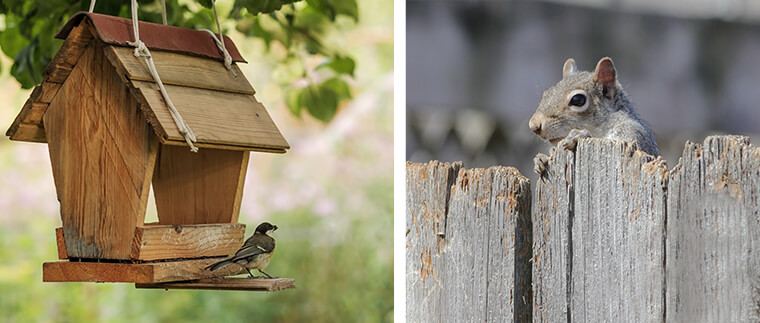
6 Steps That Will Help Local Wildlife Through The Winter
If you’ve ever filled a bird-feeder in the morning, just to see it half-gone by the end of the day, you know how hungry the local wildlife in your backyard can be this time of year. The next few months are tough for animals that might have snuck into your garden for the occasional supplemental snack. Organics are dying back naturally, and insects are burrowing into the earth (or possibly your home) to stay warm until spring returns.
While many of the species local to your neighborhood have survived on their own for generations, all of them would appreciate a little help. And if your yard becomes a known place for refuge and a steady food supply, chances are you’ll see a backyard boom when temperatures begin to rise again as these critters play a vital role in the health of your garden. Keep reading to learn how you can prepare your yard this winter to support local wildlife.
Seven Actionable Steps To Support Winter Wildlife In Your Garden
Let Your Garden Go Wild
When it comes time to pull up dead plants or give your lawn a rake – don’t do it. Leaves provide a natural mulch and suppress weed growth, plus they offer a cozy place for small animals to hunker down and hide during the colder weather. This is particularly relevant in flower beds or places that might offer more shelter.
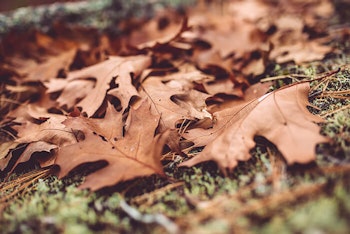
Speaking of flower beds, try to leave dead and dried plant stems alone until the spring, as some insects will crawl inside to hibernate. If you do cut them, TreeHugger recommends leaving them in a pile to allow hibernating insects to emerge.
Anything that was previously flowering should also be left alone as much as possible to provide a source of seeds for birds and rodents. You can also plant late-flowering species for this exact purpose next year.
Keep Your Pond Clean
If you have a backyard pond, you’ll want to keep it free of falling leaves and other debris, which can raise the ammonia levels in the water. If you only have a few trees and can remove them with a rake or skimmer you should be fine. If you have a lot of trees near the pond, a net should be put in place. They can be purchased inexpensively and secured with tent spikes, bricks or rocks.
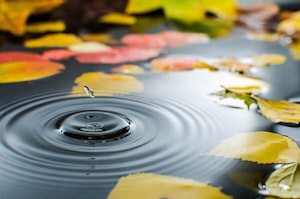
Once the water temperatures reach 50 degrees, stop feeding your fish entirely. During the winter digestion in fish enters an almost hibernation like state. The amount they need to eat is more than supplied by bugs and other things they can find naturally in the pond.
If you have plants in or near the water that don’t cope well with colder temperatures, make sure to bring them inside. The Bay Area rarely has serious freezes, but keep an eye on the thermometer just in case. If there is a freeze in the forecast, make sure you clear water lines and pond fountains to prevent them from being damaged by ice.
Feed The Birds And Squirrels
According to BBC Gardeners’ World, birds are more likely to visit a garden during the fall and winter. With fewer insects directly available, birds rely on feeders to get their needed calories. Since birds and squirrels don’t hibernate, they rely on their own fat reserves to stay nourished.
You can provide a range of seeds, fresh unsalted peanuts and table scraps (like cheese and fruits such as apples or pears). You can also pick up dried mealworms or wax worms, which can be bought from bird food supply stores.
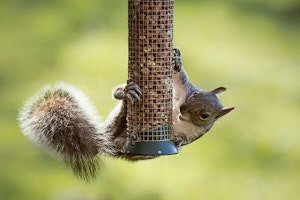
This time of year, birds will also benefit from fat, which can come in a variety of sources. The most common types are plant-based suet, which can be bought as cakes or balls in many flavors to attract different species. So have fun with it! Do your research and set out a new variety to attract a new kind of bird to your garden.
Provide Them With Fresh Water
Even when it seems cooler outside, but animals need to drink and bathe just as they would in the warm summer months. In fact, flying around in search of water actually burns more energy and can take birds farther away from food sources, so keep them close by providing fresh, clean water out of a bird bath or dish in your garden this winter.
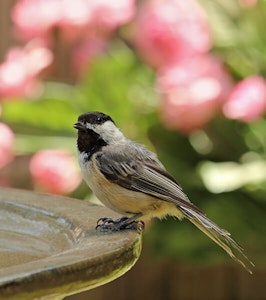
Maintain your bird bath when the nights get cold by:
- Adding a few stones or branches to the bird bath to give birds a place to perch without standing submerged in the water
- Using a container with a gentle slope that birds can easily wade into
- Not adding glycerin (which is an antifreeze) to the water. It is toxic to our feathered friends at the levels needed to prevent water from freezing and can stick to feathers, destroying birds’ insulating abilities
- Cleaning the bird bath regularly to remove bird or squirrel poop, as well as other bacteria that can be toxic to birds and would defeat the purpose of providing them with fresh water
Check For Life Before Burning Or Composting Brush
One of the most overlooked issues regarding wildlife in the winter is the lack of awareness when starting a bonfire, log fire or other similar constructions. Kayleigh Barber at One Green Planet says that during the winter months especially, a pile of logs, dead leaves, twigs, dried grasses and similar natural debris is like a siren call for small creatures. Mice, frogs, newts, snakes and lizards seek out holes and hideaways to stay warm and concealed, and a pile of brush makes a perfect home.
The same goes for compost heaps, which make lovely moist warm homes in winter – check them carefully before you turn them with a sharp pitchfork or spade!
Donate To Your Local Wildlife Rehabilitation Center
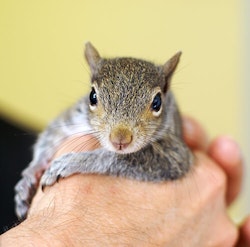
Winter is a busy time of year for wildlife rehabilitators, who are often are swamped with hundreds of small animals that are too lightweight to be released at this time of year. Typically, these animals have either struggled to eat enough to safely hibernate in the previous season, or were woken up mid-hibernation and put into danger due to the sudden demands of their body and the elements around them.
You can help ease the stress of dedicated career rehabilitators by volunteering to help them care, feed and weigh all of the animals, or by donating canned food and other delicious tidbits that will help underweight animals plump up nicely. Heating pads are also highly sought after this time of year to keep animals snug, along with blankets, towels, newspapers and pillowcases.
Ask Your Local SummerWinds Experts About Preparing Your Garden To Support Wildlife This Winter
As you make your final preparations to help your garden winter over, our Trusted Gardening Advisors are happy to help answer any questions or make recommendations on how you can support the local wildlife in your backyard. Visit any one of our five convenient Bay Area locations for advice, a new bird-feeder or just to see what’s new this week at SummerWinds.

